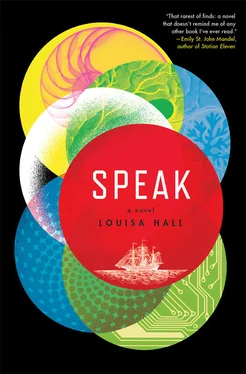Dolores and I were once close, and then we fell apart. I allowed this to happen. I didn’t pay proper attention. I gave her too little time. Only now, in the suspension of prison, our estrangement guaranteed for as long as we both shall live, do I rock myself to sleep at night by summoning her. Now, too late, I devote her the proper attention. In the endless hours of nighttime, I work to remember each line on her face, each curl in her hair, each catch of her voice. Now I bring her closer. She’s with me here in my cell; we finish each other’s thoughts. I’ve become so close to my wife, now that I’ll never see her again.
That’s all there is to say about that. I can’t even think what to say next. Where does one go from the end of a marriage? One simply has to move on. I’m aware that there’s nothing more boring than Grief. We’ve all had our losses; why should mine take up so much space? I should wrap up. I should shut these memoirs down. Only I’d like to end with a suitable conclusion, some explanation of what made me capable of such cruelty. Caught up in prison, I’ve mulled this question for hours, and I’ve developed one hypothesis, which I tell you now with the stipulation that, no matter how compelling you find it, you shouldn’t forgive me for what it led me to do. Otherwise we’re nothing more than a sad string of excuses, and I won’t sign off on such a reduction.
I’ve never been sure of myself. I’ve searched to fill in the gaps in my absent center. I’ve moved restlessly from one acquired enthusiasm to the next. As I fell in love with Dolores, so I also fell in love with a chatbot called MARY. As, in my youth, I fell for a punishing God, I also fell for the promise of codes. I’ve been taken into the arms of many pursuits. Unsure of my position, I’ve spent my life in quest of something that would hook me firmly in place. Someone to say “Stop, here, this is you. This is where you belong.” I’ve desired a red pin on a map. I’ve been a spinner at edges, a moving man on a traveling planet, incapable of coming to rest.
I don’t make this little admission in the spirit of self-flagellation. Despite all my errors, I still find reason to be proud. We’ve come, in this world of clocks and labor division, walled neighborhoods and transport rights, to be increasingly fond of compartments. We’ve become rigid since the days when we moved in lunar cycles and astronomical loops. We stick to our given patterns as if they were lifeboats and the world were a tempest.
When Ramona comes to visit me, she arrives with reports from Babybots Anonymous, the children who are recovering from their addiction to toys. She’s a young woman now. Nearly a decade after the bans, the world has recovered some of its balance. Those babies haven’t marched out of the desert. They’re all dead in the hangars to which they were transported. My daughter, part of a generation that was asked to recover from the loss of their most cherished companions, has become a young woman of great composure. She dresses conservatively and draws her hair back. I don’t think her personal life is especially happy, but she has a network of friends and she derives satisfaction from her profession. Since she graduated from high school, she’s worked for a charity that pools transport rights and takes underprivileged kids out of their developments for day-trips to the beach. She is a good person. I’m astounded and eternally grateful that such a clear-eyed, balanced young woman came in part out of me. And yet I always feel a pang of some sorrow when she slips into her sad addicts’ language. She has formally forgiven me, and asked for my forgiveness. She is doing her penance for the grief she caused her mother while devoting herself to her toy. She has reorganized her life around the 3-P Principles of Productivity, Participation, and Peace. From the chaos of total, consuming love for her doll, she has emerged with a well-organized life. She is able to love me in my prison cell, and then she’s able to leave me behind. She does not labor under the burden of confusion. Her affections are delineated and clear.
I don’t begrudge her that. I myself swung too hard in too many directions. I’ve come to a certain peace, here in prison, confined by four walls. There’s a pleasure in limited opportunities, a calming effect of strict boundaries.
And yet. Here I am, in the rec room, hunched over my computer. Wishing to explain myself to readers in posterity. Working myself up to alliterative heights. I can’t help but want more time to explain myself. I wish for more minutes, more hours, more years. To make up to Dolores, to care for Ramona. To return to our ranch, to stake up those sunflowers, to walk with my wife on the bed of our river. To explain myself and have myself known. I flail and I thrash. I want more than this sad little place with its bars, its wires, its cells.
The pornographer on my left types with one forefinger, a demented chicken, pecking away. A tax evader is chewing on his fingernails. We’re all staring at our screens, stuck here, hoping somehow to break free. Wishing for more than we’ve been given. My cursor blinks, blinks, blinks. A wall that appears and disappears, appears and disappears once again. Unceasing. Questioning. What will come next? it wants to know. It prods me forward, blinking and blinking. Do not stop talking, it reminds me. Do not stop speaking. You can never come to an end.
Turing
Adlington Rd.
Wilmslow, Cheshire SK9 1LZ
12 June 1954
Dear Mrs. Morcom,
My name is Susan Clayton. I am the cleaning woman employed by our mutual acquaintance, Alan Turing. I am writing you in the most tragic of circumstances, to inform you that Alan has passed. I discovered him in his bedroom last Thursday, having departed this world some time earlier in the evening.
I write to you with this news because, in cleaning out his desk, I found this letter, unsent for some reason. I felt you should receive a piece of correspondence he meant for you at some point. I found your address in his address book. I hope you don’t mind my interference.
Though I only knew him a few short years, I am quite torn up at his death. He was a gentle man. I am sure we will all miss him immensely. If you feel you have any knowledge of the circumstances in which he died, please do contact his mother. She is unable to believe he took his own life in such a fantastical fashion, leaving no note. She believes it must have been some strange experiment involving that poisoned apple, and I am inclined to agree. There were always chemicals and solutions lying about, and he was so absentminded sometimes. Perhaps you can shed more light on this for his mother’s sake.
In sadness,
Susan Clayton
ENCLOSED:
Dear Mrs. Morcom,
I have felt quite wretched, since sending my last letter, that I failed to add our traditional postscript. I felt I had betrayed the deepest of our mutual trusts, and yet I had little energy to write. I am better today, but lest my resolve should flag midway through, I shall jump straight to the chase.
P.S.: Not all is lost. I know I shall pull myself out of this large-breasted mess at some point in the future. I will get back to my work. Towards that end, I have been visiting a therapist, whom I find to be helpful in parsing some of my worst moments of doubt.
On his advice, I have been devising a little story about the whole sequence of awful events, a practice I find to be extraordinarily helpful. It is soothing to see one’s life in quaint panorama, outside of one’s own corpulent body. I’ve called my protagonist Alec Chaplin. He takes things with more of an even keel than does his original. And yet he has some of my spirit, I think, and I find myself admiring his pluck as he works his way through this latest problem. You’ll be amused to know that he is an expert in space travel, the profession that Chris and I used to dream of. He is preparing plans for a civilization on Mars, to be set up after Earth has imploded. There, people will live in peaceful little communities, assisted by clever computers, surrounded by large swathes of greenery and a sea that is silver rather than blue.
Читать дальше












